THE ROB ROY IN THE BALTIC.
John MacGregor
HARPER'S NEW MONTHLY MAGAZINE
1867, pages 430-442AMONG the remarkable voyages which have attracted the attention of Christendom since Columbus discovered America, and Captain Cook circumnavigated the globe, the canoe cruises of amateur Captain J. MacGregor, M.A., Trinity College, Cambridge, deserve a place. The readers of the Magazine, some months ago, followed the course of the stanch little Rob Roy in her trip of a thousand miles. But although that expedition was a great success, the master of that enterprising craft was not entirely satisfied with when he was in search of perfection. So he carefully designed another canoe, with every excellence possessed by the original Rob Roy, and a hundred more; and this, having been tested on many lakes and seas, proved to be the owner's beau ideal -- he has been unable to find a fault in her build.
The new canoe -- also christened Rob Roy -- was built of oak, except the top streak, which was of mahogany, and the deck of cedar. She was shorter, narrower, shallower, lighter, and stronger than her predecessor, being only fourteen feet long, twenty-six inches broad, eight and one-half inches deep, and weighed, with all fittings complete, seventy-one pounds. He, she, or it was designed to sail steadily, to paddle easily, to float lightly, to turn readily, and to bear rough usage on stones and banks, and in carts, railways, and steamers; to be durable and dry, as well as comfortable and safe.
Mr. MacGregor's theory was that "a canoe ought to fit a man like a coat;" and to secure this the measure of the man should be taken thus: The first regulating standard is the length of the man's feet, which will determine the height of the canoe from keel to deck; next, the length of his leg, which governs the size of the "well;" and then the weight of the crew and luggage, which regulates the displacement to be provided for. The Captain was measured, and the canoe fitted. She was furnished with a little basket of cooking things, and rice, soup, tea, coffee, chocolate, sugar, salt, and a good supply of biscuits, also with a spirit furnace; the whole affair in the basket weighing only about three pounds, and the owner's personal luggage for a three months' tour weighing nine pounds. It was a mathematical problem to decide how many inches of portable soup, how many ounces of rice, squares of chocolate, cups of coffee essence, and spoonsful of tea should make up the cargo; but when this problem was solved the captain, mate, crew, and passengers of the Rob Roy were ready to commence a canoe cruise through Norway, Sweden, Denmark, Schleswig, Holstein, the North Sea, and the Baltic.
Two days in a steamer from London brought Mr. MacGregor and his canoe to the town of Christiana; thence by the railway that runs along the lovely Glommen River, they were carried to Konigsvinger, about sixty miles northeast of Christiana. Norway and Sweden are covered with an entanglement of waters in rivers, lakes, and pools, netted together all over the broad surface for a thousand miles; and our enterprising canoeist resolved to push his way through these, in some way or other, to Stockholm.
In giving a brief sketch of this tour, we shall keep, without special marks of quotation, the form of a personal narrative. And the reader must fancy himself listening to a recital of adventures by the justly proud owner of this little skiff.
==
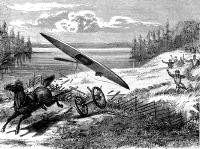
Upset
The next morning after arriving at Konigsvinger, the Rob Roy was placed in a dresine -- a carriage on the railway, moved by cranks and treadles, as a velocipede is worked, and to which vehicle there clung as many persons as could hold on. We rumbled along until the shore of a small lake was reached, when the Rob Roy was carried over the rank grass, and gently launched upon the water, amidst cheerful smiles and encouraging glances from many visitors.
The Rob Roy's engine soon settled down to work with a regular swing; and the even stroke of the dark-blue blades were long and strong in the new water. Then the mind, placid in solitude, turned itself inward, thinking of the length of the journey -- the possible perils of the enterprise -- the unknown difficulties to be met, the mysterious future of incidents to happen, the strange people and queer languages, and curious nights and days, the falls and deeps the rapids and shallows, the waves and whirlpools, the upsets and groundings, the calm and breezes. These and all the other countless varied features of a lonely water journey in foreign land were all imagined with an eager intense longing to meet them every one.
At the end of the quiet lake, wooded thickly to its edge, the map showed a river; but, alas no river was there; and as I wondered in silence the quiet woods resounded with the blast of a trumpet. In a deep, sequestered nook there were three companies of men drilling amidst the trees.
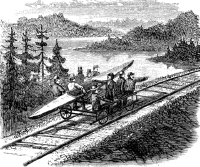
Dresine
Every man of them had caught sight of the Rob Roy, and though they marched on in column, all had "Eyes right," for all were staring sideways at the canoe. The officer, being a wise man, dismissed his array, and down they rushed en masse to the water.
The captain explained to me in French that they were the local Landvehr, camping out for six days; and as the men crowded round, each holding his hat in his hand whenever he came within a certain radius of his captain's august presence; and caressing the little canoe with smiles of pleasure, he posted a sentry with fixed bayonet to guard the Rob Roy, lying on the green rushes in the sun; and led me off to his hut, so prettily garnished with nasturtiums and pictures.
After refreshments were served a cart was got, and we started for another lake. The soldier leading the horse allowed it to go too fast, and in vain I shouted to stop. All the others shouted too. Off started the spirited nag downhill, and dragging the man after him, until the pace quickened into a full gallop; the more we shouted the worse it was; the horse kicked and plunged, and overthrew the man; then darting into a corn-field, he rushed headlong down to a gate, where the cart was dashed to pieces, the wheels going one way, while the shafts and canoe were dragged along at a racing pace, till at another fence the whole was overturned amidst a crash of broken palings. While running at full speed I endeavored to become cheerfully resigned to the terrible catastrophe, and even to arrive at the scene with a laugh, which was probably hysteric. I heeded not the broken cart and the runaway horse, but rushed to my canoe.
I turned her over as one would tenderly handle a child thrown from a carriage; and what was my wonder to find she was perfectly whole -- only the flagstaff broken, and one or two ribs, and scarcely a scratch on the fine varnish, and not one crack in the cedar deck. Nay, there was not a bottle broken in my stores, and all this because she had made a somersault on the paling just broken, as she landed on it most happily on her strong oak stem, which still hears a deep mark, but no other injury.
A new cart took us to Oklangen Lake, deep and dark, with matted trees and luxuriant plants overgrowing its rocky sides. The roar of a waterfall announced that a river was near; so, after landing and satisfying hunger with soup and biscuits, we launched on this river, which for miles was like a little trout stream, with purling ripples and long pools quite concealed by thick foliage, tangled ferns, and fallen larches, drooping so low as to cause me to stoop again and again. Sometimes I had to wade; but the warm sun made it pleasant to dabble in the bright crystal stream, and chase the water-ouzels or grasp at the fish, always, however, in vain.
Another lake : and with it new pleasures, grander distances, lofty cliffs, rocks, and islets, stately trees, lively waves; or, in the evening sunlight, a beautiful picture on the liquid mirror, with floating clouds piled high in the air, is reflected from below. But these clouds are not always so romantic and so far out of reach. Soon they closed round, and very prosaic rain teemed forth and hissed again on the surface of the lake. There was no eluding this straight downpour, and the crew might have mutinied had we gone on much longer in a deluge; so it was determined to stop at the only house, and to fish in the evening if the rain should cease. I put the Rob Roy safe under a bank, and walked through thick bushes to the humble dwelling.
Only an old woman was inside -- all the men were away; but we praised the scones she was baking, so she brought them in with coffee, but was evidently uncertain whether it might not all be he a dream to see, for the very first time in her life, a grown man dressed in gray flannel, and talking what sounded to her like gibberish, yet manifestly very well able to eat like the mortals of her acquaintance.

Wading
The worthy old dame was persuaded by signs to give me a room; and I coolly pulled the canoe right into this bedroom. My bed, to be sure, was only straw, though the lady gave me a sheepskin -- and a great population in it -- to sleep upon, with my cork seat and macintosh for a pillow. The surrender of comfort which was made to the inhabitants of the sheepskin was compensated for in some measure by the fresh air of the morning, the new sun of another day, and the soft dip of the blue-bladed oar.
In this northern tour, among lakes and intricate seas, it is not always easy to "find the way." There is either no current to guide you, or an unseen one which deceives; and there are countless islands to mislead. You sit so low in the boat that one tree-clad rock may hide for an hour the very bay you are in search of. The sun behind the clouds is no index, and the wind changes with every bend of the shores. A compass, unless the needle is six inches long, only puzzles your pate. It gives the general direction; but what you want is the right or left of a particular islet perhaps only a hundred yards long. But one charm of the canoe trip is this very demand upon that instinct -- for, after all, it is something like the faculty of an animal -- which, being developed by months of travel in this manner, enables you to say, with confidence, "I feel sure that the inlet to such a village is behind that rock."
In most of these lakes you can not inquire your way. There is nobody to inquire from. You are going where nobody else goes, and so nobody knows the way, and nobody could make you understand it if he tried. "The map ought to help, then," it may be said. Yes, the map helps much in the easy places, but it confuses you in the hard ones.
For example, you get among the 1400 islands in the Malar Lake; there are not thirty of them marked even on the largest map. Consequently any attempt to depend upon a map involves one in immense difficulties.
The obstruction of timber logs is another novel embarrassment. These logs are cut in the forests, and then tumbled into the water to find their way down stream. Men with long poles push them into the current when they get embayed in crooked corners. But in August these men are not allowed to walk by the river for this purpose, because the crops are grown up; and so one or two logs will become fixed, and then, hundreds and thousands gradually arriving, the whole water is covered with a brown colored raft.
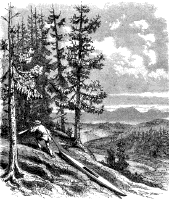
Overland
Once, in a very lonely spot on the Vrangs, we found the timber reached as far as the eye could see, so we concealed the boat under a dark tree, and then toiled up a hill on a calm, hot day. The view was at once charming and alarming. Wood, wood, wood, on to the horizon; the wood on shore being green and growing, and every winding of the river entirely covered with dead logs, thousands and thousands, silent and brown. Nobody in sight and no house, I sat and waited for events, but nothing would happen, nothing seemed disposed to turn up -- only birds chirped.

In Arms
Lunch and a cigar braced me up to the inevitable task, for we must drag the Rob Roy through the forest, or we must die and be buried there, like the Babes in the Wood. This was a heavy work to contemplate; but soon a vigorous spirit was aroused; the magnitude and novelty of the undertaking -- the curious plans we had to adopt for getting over dykes, hedges, brooks, and hillocks -- the exertion required to penetrate thickets and copses where no man (much less a boat) had ever roamed, became deeply interesting, and we worked for hours, until by double journeys the boat and things were transported to the open country, and we launched the Rob Roy on its proper element.
At length we passed the Swedish boundary, and entered a beautiful chain of lakes of all variety in size, shape, depth, color, and kind. Rocks of every shape and curve, covered with spruce, larch, and beech, with bays, promontories, and islands, opened in gradual panorama as we passed along; and a gladsome buoyancy of spirit in the fine fresh breeze forced me to shout and sing aloud and alone, or to whistle in bright merriment gayly by the hour.
One fine sunny evening we landed at the end of Lake Ranke, and walked up to a house where was a very old woman with one eye. She was terribly puzzled when I invaded her cottage and urged her to come and see the boat. But when she had seen it she at once took a motherly interest in the skiff, and we carried the Rob Roy to a cow-house, where it was concealed in the rafters, while I took my luggage to a fine farmhouse, and knocked, and walked in. At first only a cool reception; but when the host, his wife, and three comely daughters went down to inspect the canoe a complete change followed. "They came, they saw, I conquered!" Luggage may be brought by a tramp; but a boat, and such a boat, could not but certify the traveler and arouse great enthusiasm. Triumphant progress, therefore, of the Rob Roy on the shoulders of plowboys -- proud to bear her home -- grand concert in her honor by the three maidens -- admission free -- feast of bacon, pancakes, potatoes, rice and milk, in honor of the occasion.
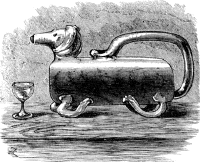
Dog Brandy
A sail on the lovely Elga Lake, through the Glava Fjole and the Bjorno Sje, resting here and there as pleasure or convenience dictated, until at length, early one morning, the Rob Roy embarked on a squally sea; for the noble Lake Venern may really be called a sea. There were many interested lookers-on, and all hats were off; and warm adieux wished "happy travel" to the little boat, no doubt the smallest craft that had ever ventured on this great lake. For an hour or two the course was among landlocked bays and high hills, with dense wood to the water's edge and we did not feel the strength of the breeze there ; but, on facing round the last lonely wooded point the white waves, and angry clouds, and thick drizzling rain, showed that full steam must be put on if we meant to reach Carlstadt that night, where letters were to be forwarded, and my packet of reserve provisions.
A more unpromising day could not have opened. Wind, rain, and fog; and each was vigorous in opposing me. Therefore I landed where I could ponder half an hour, with a cigar, and consult with the boatswain and mate over our chart; and the question was solemnly debated, "Is it not foolish to go on with thirty miles before me in this whistling mist, and on this huge lake?"
A black squall then varied the dull gray of the horizon, and I had to land for shelter while its fury was spent on the rocks above me. Another portentous cloud followed, and I resolved to land at the very next house. It proved to be a poor fisher's hut, where two sailors, a rosy faced boy, and a woman with a dirty baby, were eating fish and potatoes in their hands. I gave some sugar to the baby and some rice to mamma; in return for which I received some bread, joined in the howl of potatoes, and made my coffee by their fire. Then again into the tumbling waves! The numerous islands were perplexing, and the wind veered so that I was utterly puzzled. But overcoming all difficulties, we at length reached Carlstadt.
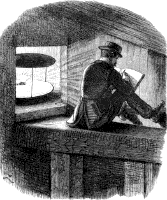
Waiting
The cholera, however, had been prevailing among the poor people living on the flat shore, and the air was pestilential; so it was with no small pleasure that I found a little steamer alongside the quay, and we were soon on its deck. Kind Captain Dahlander came forward with
"How do you do? Are you wet?""Yes, very."
''Then change instantly; this is no place to get a chill in;"
and in a few minutes I had his big great-coat around me, and a stiff glass of grog inside. The curious old bottle from which he poured this opportune brandy, that saved me from a chill, and probably from cholera, was shaped like a dog, with its tail for a handle, while the fiery fluid came from its mouth.
Not long after this adventure the Rob Roy and her Captain landed on the island of Bromo, where a steamer would pass at night, which might prove a convenient conveyance to West Gotha Canal. The evening was cold, and it was tedious work to wait seven hours for a steamer; but the keeper gave me the key of the lighthouse, and I rigged up my kitchen and made coffee there, and then put on two complete suits of clothes to keep me warm, and paced the harbor quay until the stars came out. Then, mounting into the lantern of the lighthouse, I sat by the camphene lamp both for light and heat, reading and sketching and thinking through the midnight hours, with a lonely feeling and anxious expectancy of a steamer's whistle in each gust of wind. A quiet passage in the steamer brought us to Vadstena, where the canoe was laid out for a thorough overhaul and examination. The ship's carpenter duly reported that, with the exception of four ribs broken on the Vinger See, she was perfectly stanch and sound; and so we launched her with confidence on Lake Vettern, under a parting cheer from the assembly on the pier.
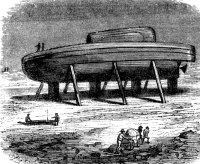
Gunboat
The Motala River, as it rushes out of Vettern to run through a chain of lakes, and by devious ways to the Baltic, is seized upon at once, that it may yield some of its water power to every body on the banks, and so there is a network of barriers, dams, sluices, forces, falls, weirs, and rapids, with a ceaseless splashing sound, and the rap-ap-ap of busy waterwheels, and clang of great hammers, and hoarse hissing of swift saws -- all mingled with the hum and hustle of many men at work. At Motala there was a Swedish gunboat, very like a canoe in shape; and the Rob Roy was carried into the building-yard and placed beside its enormous fellow of the waters to the great amusement of the workman and myself.
When washing-day occurred on board the ship Rob Roy all hands were piped on deck by the boatswain at an early hour; and the last pair that came up were told off to "scrub ship and wash clothes." All these articles were then put out to dry on the boom, where they dangled in the sun and the breeze, quite regardless of the public opinion or otherwise of landlubbers ashore.
It was the duty, of course, of the mate to make a correct list of the washing, and to enter the same in the log. These lists were not dissimilar, nor were they voluminous. The following is a copy of the longest ever known: "List of washing: One sock, one pocket-handkerchief; another sock, the collar."
When it was necessary to wash the sails of the canoe (to maintain her respectable character under critical examination), this was done during her stay in some port, while she was dismantled for a time, and the crew had shore leave. Then the sails were sent to a regular washerwoman.
The head cook of the Rob Roy was an ignoramus in his art. His attempts were humble failures; and he trusted his guests to enjoy rather the circumstances and poetry of the repast than the delicacies thereof. His first attempt to make an oatmeal cake was most disheartening. He mixed the water and oatmeal, and had a round tin plate heating on the flame, whereon the mixture was poured. It steamed, it set, it dried hard ; and then he removed the plate from the fire, but, alas ! the cake would not come off the tin plate till it was torn away with struggles and a knife; and then all the lower part of the brown cake was covered with bright tin, and it had to be thrown away with a sigh, and gone was my only hope of breakfast; for even sea air does not enable you to digest sheet metal.
Practice taught by hunger improved the cuisine steadily, and in a rough way we soon learned to put smoking soup on the table, improved by the addition of bread, rice, or biscuits. Chocolate succeeded well, and tea and coffee; and the crew soon became accustomed to eat raw fish when they saw other people eating it with gusto.
Early one morning a crowd gathered to see the Rob Roy launched on the beautiful Lake Roxen. The canal by which I had reached the little village, where I had found a night's lodging, approaches close to the lake, but about seventy feet above it, and the usual descent is by eleven locks ; but as they are close together, the canoe had merely to slide down the grass sloping to the verge of the water. A large party of people happened then to be coming up the ascent, while their steamer would be delayed two hours or more in passing the locks; and a good deal of amusement was afforded to them by seeing the swift traverse of the Rob Roy over the grass.
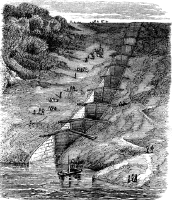
Locks from the Canal
Fishing was a grand addition to the pleasures of canoeing. In the lakes fish are caught best with the minnow and the trolling line, they being dainty animals that like to dine methodically, and to begin by eating fish. As for the artificial fly, their ignorance of its satisfying sweetness is lamentable. Therefore, as I had brought only flies it was chiefly in the rivers that I had profitable sport, for sport it is even to fish without catching; and the man who fishes for the fishes, and not for the fishing, is not a true fisherman. But the streams were frequent, and good luck sometimes attended me. Once, casting my fly behind a great rock, it was taken by a huge fish, who played in the most puzzling manner, often jumping out of the water and dragging the canoe near rocks and rapids.
Three times he got under the boat; and at length, what with the fish, the paddle, the rocks, trees, and current, I got so entangled that my rod slipped from my hand. But it had no reel on, so it floated, and we gave chase up the stream and grasped it again the fish still on. After various ineffectual attempts to secure the prize I fairly shoveled him into the canoe -- a nine-pound grayling, and well worth all the time and trouble. To fish, however, in a small canoe, when you manage the sails, the paddle, and the rod, when you have to attend to the wind, the current, and your flies, is a full tax on energy and demands great attention.
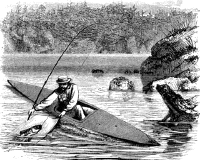
By the Nose
At length, emerging from the maze of inland waters, we reached the shores of the Baltic Sea. To give me a good long day in the open sea, I arranged with a steamer to take us along the winding estuary of the Broviken until she had to turn southeast on her course, and there to drop me in the waves, to paddle and sail northeast for Stockholm. When we came into the bay the steamer stopped, and I shoved the Rob Roy over her side, stepped in, and in a few seconds I was paddling away on my course. It was a supremely fine morning, and I glided along under the tall cliffs with a feeling of romantic solitude. Later in the day the wind suddenly turned about right in my teeth, and a great thick fog bank came hustling up along the sea, yearning to enfold the poor Rob Roy in its clammy and dim cloud, like soft cotton wool. I landed at a little village to wait for finer weather, which came not; and I resolved to wait for the steamer, which was to pass there about midnight, and to take my canoe on board.
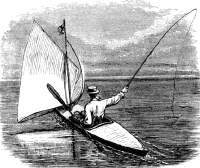
Sailing and Fishing
The rain soon began to patter, and I had to pass weary hours in a very poor inn, away from my boat, and therefore miserable. At last when the red lantern was run up as a signal for the steamer to stop, some of the men told me that this particular captain was "not good," and would insist on my going out to him. And so in fact he did. At the last moment I was obliged hurriedly to launch my canoe, wholly unaided, tumble my luggage in, and paddle away in the darkness. When the steamer stopped there were a dozen hands reached down, but all too short to get hold of mine; and just then a great lumbering boat came alongside, before I had handed up my rope to the steamer, but after I had resigned my paddle. It was a moment of great peril. The Rob Roy roared a loud shout, but the other clumsy boat would not hear. One foot more and we should be plunged under water with a broken bow. An instant decision was made to shove off from the steamer; and there was the luckless voyager standing up in a canoe in the dark, on the waves, without his paddle, and with his long rope dangling in the water.
It is easy enough to stand up if your paddle is retained as a balancing pole, but the position depicted in the woodcut was one of no small difficulty. Still it was best to keep standing, because gradually the wind bore me to the steamer's side again, though I found her side far too well polished for me, as my nails vainly clung to the cold, smooth iron.
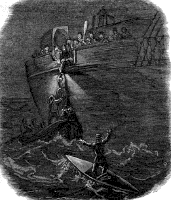
Perilous Position
Nevertheless the Rob Roy was speedily housed on the steamer's deck; and I at length fell into a deep sleep, from which I was not aroused until we arrived in Stockholm. So ended my first paddle on the Baltic. Stockholm is the place for a good rest, which was much needed by the crew of the Rob Roy. A comfortable hotel and plenty to see and to do was a wholesome interlude. Stockholm, also, is the very place for a canoe, or any other pleasure boat, though few are to be seen on the waters. But for the utilitarian purposes of traffic and speedy carriage the people make good use of their lakes and rivers. A fleet of lively little screw-boats play upon the waters. As these are of every size, some only as large as a small rowboat, their constant movement, and the puff! puff! of their tiny engines, creates an animation on the water which relieves Stockholm from being dull -- if indeed, a place can ever be dull which rests upon the graceful eddies of a sunlit sea.
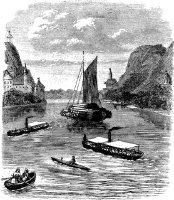
Stockholm
The Rob Roy went by steamer through Lake Malar to Orebrö; thence in various ways, by steamer, by rail, or by the impulse of her own paddle, to the shore of Lake Venern ; for the Captain had resolved to enjoy one more pull on its broad bosom. The great Lake Venern is one hundred and forty-three feet above the sea, and has more than thirty rivers pouring volumes of water into it ; but only one stream, the Gota River, issues from the lake to the sea. This rushes out noisily, with a series of mad bounds and vigorous plunges. The eddies and regurgitations caused by this violent exercise produce some eccentric phenomena, one of which is called the "minute tide," in which a swelling of the water once every minute fills up and empties again a quiet pool a little withdrawn from the river course.
The gale was blowing and the rain falling as we launched the Rob Roy on the waves of Lake Venern, amidst the plaudits of the spectators and their best wishes for my voyage. The wind was southwest, right in my teeth, and I had a hard pull to breast it; but then the current of water was with me, and when this expanded into Lake Vassbotten the voyage became exceedingly interesting. It was here that in the murky distance I noticed a steamer coming, and steered straight for her, to show to all on board how well the canoe behaved in heavy surf. Just as we neared each other a loud cheer came from behind me. This was from the crowded decks of another steamer, which had overtaken me unperceived, because of the deafening sound of the wind; and as the passengers and crew of both steamers cheered and waved handkerchiefs, crying "Bravo, Rob Roy!" it must be owned that the little boat felt a thrill of honest pride in its heart (of oak), and dashed the white spray from its breast with an exuberance of buoyant energy.
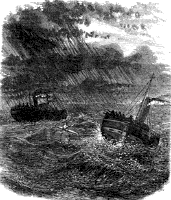
Bravo, Rob Roy!
But soon a black cloud came looming up; then a strange lull, foretelling one of those terrible squalls which cover the water with foam, whisked from the crest of every wave, and borne along on the blast in a blinding shower of spray. Therefore I paddled swiftly to land, to find shelter there during the hurricane. This was the only squall the Rob Roy ever "shirked."
The two whirlpools on the Göta were, after careful examination, easily passed, amidst the cheers of a crowd of spectators. In previous trips I had found whirlpools of a similar kind, and had practiced crossing them until I thoroughly understood the proper method. I made a tour of the pretty town of Göteborg in the canoe, traversing its canals and carrying the boat over obstacles in the streets, until the crowd running after the Rob Roy got breathless in the pursuit.
After a pleasant passage in the steamer Svea, we enter the Sound, with Denmark on the right hand and Sweden on the left; and the captain yields to my request to lower the canoe there and then into the sea, to the great surprise and amazement of all on board. Away goes the Svea; the engineer of the Rob Roy receives the command "Ahead easy," while the natives of Helsingborg line the shore, amazed to see a canoe approaching them from outside.
Here the Rob Roy rested over Sunday; and then we were to cross over the Strait from Sweden to Denmark. It sounds grand as a feat to do, but the passage is at most only three or four miles ; and in a gloriously fine morning the canoe was carried down to the water, and my paddle plashed in the new ripples, eager for the start, as a horse paws for a gallop. Ocean was at last in good humor; but, nevertheless, he was not to be trifled with, so we skimmed over his face daintily, lest the sleeping sea might be awaked. Soon the old gray towers of the Kronberg, on the Danish side, showed clearer and looked almost lively under the morning rays, while the spray spurted up somewhat lazily against its seaworn walls, now hoary with the splashes of many centuries.
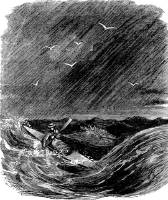
False Stroke
Idlers we had left on the pier of Sweden, and we passed idlers also on the Danish pier. who had, of course, seen the little boat gliding over the waves, and welcomed her arrival eagerly.
A day was spent coasting along the pretty shores of Seland, until countless villas, pleasure boats, and bathing boxes announced that Copenhagen was being neared. The Rob Roy, carried through the streets of Copenhagen, of course, attracted a great crowd; and the head waiter of the hotel (being a man of sense) conducted her upstairs, where the great ballroom was allotted for a boathouse, and there the canoe rested gently on an ottoman.
After some delay at Copenhagen the Rob Roy was taken by rail across Seland. In the harbor of Korsor I launched her fearlessly, and had a charming time of it (quite wet, of course, with spray) bounding over the rollers and dashing through the white water, while the whole population assembled on the pier, longing to see how the bar would be crossed by the little "kayak," as they call it; but their plaudits urged me to more daring trials; and at last, having got out farther than usual, among waves sharpened by opposing wind and tide, I lost my head for a moment.
When waves are long enough to allow the boat to descend the face of one and then to rise on the back of another without being caught in the trough between them, then it is really of no consequence how high they may be, for the canoe will ride over each wave like a cork. On this occasion I had got into a position where it was not expedient to turn the canoe round, and was therefore returning stern foremost, which practice enables one to do quite safely. The Rob Roy was progressing gallantly with the wind and against the tide, when, on arriving at the top of one of the billows, I suddenly saw that the next one was thin and the top curled over. Forgetting at the moment that I was going stern foremost, which, of course, reversed every operation, I gave a powerful stroke precisely in the wrong direction -- that is to say, forward, and thus both my own arm and the high-topped crest drove the bows of the canoe deep into the base of the wave before me. As the deck disappeared, foot by foot, but all in an instant of time, it flashed upon me that I had made a fatal error. My nerves shrank up as when a schoolboy expects the cane. Down came the great crested wave full on my back, and deluged me with water. A good ducking was endured and a good lesson learned: "Never go stern foremost against short seas."
Sonderburg, which we reached by steamer, is a very pretty place; and the little inn was close by the water, and therefore convenient for the Rob Roy. Yet it possessed the usual features of an inn. First, the box bed, with sloping pillow and footboard, far too short. Then there is the saucer of a basin, and teacup of a water jug, and handkerchief of a towel, and the blind that won't pull down or stop up, and the pepperbox that won't pepper, and the door that won't lock, and the bell that won't ring, and, finally, the maidservant that won't go away out of your room -- nay, bolts in to see you at any hour -- all hours, night or day -- and without the slightest attempt at a knock beforehand. Pooh! these are the trifles of travel; and it is really too bad even to allude to them when so many days of glorious pleasure have been enjoyed with zest by the crew of the Rob Roy.
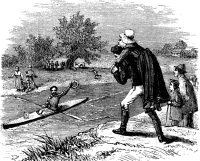
Grandmother
Our next destination was Flensborg, which place we reached after a series of romantic adventures. The little Rob Roy was put on the top of a railway carriage, while I went inside; and thus we arrived at Altona, a suburb of Hamburg; arid next day I launched on the great, dull, white-colored Elbe, and paddled along the lines of tall ships, huge steamers, bright-colored smacks, and boats of every rig, hue, and nation in this fine, rich harbor. I had resolved on a three days' cruise on this broad river, and amidst the pleasant canoeing came many a curious adventure.
The first night was passed at Gluckstadt, a quaint, old-fashioned village in Holstein. The people and the place seemed to be so interesting that I resolved to make a canoe voyage into this strange country; but this was by no means an easy matter, for the navigation is intricate and the language unutterable; but then the Rob Roy was not to be stopped by difficulties; and when it was given out in the town that "the Englishman" was to sail up the Rhyn River, and get on the net of canals which go forty miles into this flat land, every one was astir. The river led through a perfect series of market gardens, full of most magnificent fruits and vegetables, with every foot of ground tilled to the water's edge, and pear trees drooping over the canoe. They were capital, sweet pears, I do assure you.
Then we came, after some miles, to a village where the schoolchildren rushed out en masse upon the rustic bridge, screaming joyously, and every house was emptied. Next came the fishers' boats, and then the vegetable-boats, with women rowing them, and then the Rob Roy emerged from trees and gardens among the verdant pastures, with tall reeds and pink clover brushing my blue paddle blades, and wondering cows staring, but not convinced. In one village I noticed a man among the crowd, who at once ran away; but he presently returned, carrying upon his back no less a person than his grandmother. Her position was by no means a comfortable one, for he held her by her wrists over his shoulders; but his young face was ruddy with delight that he had brought her in time to see. With due respect to hoary heads, I approached and made a profound salam to the lady; while she stared at me over her grandson's shoulder, evidently not at all satisfied with the arrangement of things in general.
A thick drizzling rain was falling, the wind whistling, and muddy waves were tossing on the Elbe, when the time came to paddle through them from Gluckstadt, if we would catch the steamer to Heligoland. This steamer would come along the other side of the river, it was said, and to reach it we must paddle through an angry sea; moreover the labor, and two hours' wetting, would all be in vain unless the captain would stop his steamer for the canoe, which was doubtful on such a day. Therefore I engaged a pilot boat, which would sail further up the river, and hail the steamer some way above me, to point out the Rob Roy in the waves; and while the crowd wondered at it all, I pushed out from the little harbor into the great, white, rolling Elbe. After an hour's hard work, during which the Rob Roy, buffeting and boxing the waves, behaved nobly, I ran the canoe into a mass of tall reeds to see if she had any water in her. Only three "spongefuls." The swell rose and fell sleepily among the tall reeds, which only rustled; otherwise there was blank silence. Soon I heard a sharp conversation between the pilots and a number of men on the bank, who could not then see me among the reeds, but who had crowded down to the spot. Suddenly the pilot called out "Come away, Sir! Come away, Sir, instantly! The men are going to catch you!"
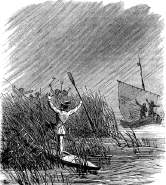
A Wild Chinaman
These natives had watched us riding over the waves, and could not make out what all this meant; but the pilots had told them I was a wild Chinaman escaped from a ship, and that they were in chase of me. Away went the duped natives, and presently brought clubs, sticks, and a great hatchet. They were a clumsy and ignorant set; but I thought it was all meant for fun, so up rose the captain of the Rob Roy, his head only over the reed-tops, and his face grimacing, and paddle whirled aloft, just as an escaped Chinaman would doubtless do, with wild shrieks as an accompaniment. The natives became frantic; but there was only mud there -- no stones to be had. The pilots, to humor the joke, sailed after me, splashed with their oars, lowered their sails, and shouted aloud; while the canoe darted hither and thither wildly, but always eluded their grasp, and sought refuge again in the reeds.
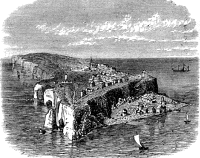
Heligoland
At length the steamer came in sight; the pilots hailed, and I placed the Rob Roy where it could plainly be seen as it rose and fell on the waves. It was a moment of suspense, as the great black hull came looming on. But suddenly it stopped, and I shouted, "Hurrah!" "Thanks, Captain, thanks!" Then before me, in the jumble of waves, mist, and rain, there rose up two great pointed crests, where the steamer's swell crossed the waves of the Elbe, and these must be passed.
As the little canoe came rapidly to the first of these waves it was so much higher and sharper than usual that I felt,
"Here is the Rob Roy's grave. If in the upset now certain I let go of my boat and hold by my paddle, the steamer people will save only me and let the canoe drift away, for why should they stop for her? Therefore I must loosen my hold on the paddle and cling to the boat, however difficult, for then they will rescue us both. But how ?"and looking up (this the last thought vivid on my brain), a "by that boat hanging on the davits, I see it is ready." All this was as a flash of instant thought, and then a thud of angry, muddy water struck my cheek and knocked off my straw hat (luckily secured by a cord), and then down, down, down we swooned, and again a blow, a twist, and a squeeze, and both waves were past, and I could hear the end of the word "Bravo-o-o!" as the mate shouted loud from the steamer above.
Right swiftly leaped I by the side of the vessel, while a last spiteful wave followed me running up the steps, and embraced me with one cold grasp about the loins -- a drench to say "Goodbye." The Rob Roy was safe aboard, and I rushed into the steamer's cabin, still trembling with a certain thrill of excitement, and repeating over and over again, "I never will again board a steamer in a gale."
During the three days we spent at Heligoland the sensation of "incongruity" was most powerful. A charming island quite neglected. An English land full only of foreigners. A rock with wooden houses. A poor town with rich visitors. A splendid beach without a pier. The airiest of nests with drains so foul. Crowds of thinking Germans, but only one bookshop. Planks for pavement where no tree grows. One church, one school, a good brass band, and a beautiful glee chorus. What a neat, little, pretty, open, confined, old-fashioned, interesting, neglected place to be sure!
We had a holiday trip in the Rob Roy around the island, and then a paddle up the River Geste, before we met the Falke steamer which was to take us to England. About ten miles below Gravesend the Rob Roy became impatient to be paddling again, and was let down into the water. She sped on and on, till in the distance I saw the funnel and masts of a great steamer, which had been sunk by a collision in the river, and we made straight for her midships; and though the men in boats around shouted to warn, and ordered to go back, the Rob Roy actually paddled right over her deck, with a powerful stream rushing and hissing through the rigging, and many tangled ropes all hanging about, exulting that she had certainly run over a steamer, though no steamer had ever run over her.
One more danger must be encountered, one last peril bravely met, before the Rob Roy and her Captain could rest in quiet at home. A dreadful current must be passed, on which no steamer or ferryboat could sail, and where it would be madness to paddle my canoe. The waves of the Baltic looked insignificant, and the deepest part of Lake Venern seemed shallow, in comparison with this surging stream. I sought in vain for aid while gazing into the fearful vortex; then nerving myself for a desperate effort, I dashed in with a shout. A short, fierce struggle and we had safely crossed the Strand, and landed on the dark old bridge of Temple Bar.
Here we will bid our hero -- whose language we have so freely used -- goodbye, and join in the words of the poet: "Now let us sing, long live the King, Macgregor, long live he ; And when he next doth sail a voyage, May I be there to see !"
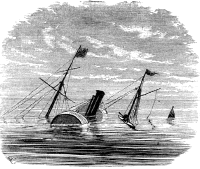
Running Over a Steamer
..
VOL. XXXV. No.208.
© 2000 Craig O'Donnell, editor & general factotum.
May not be reproduced without my permission. Go scan your own damn article.